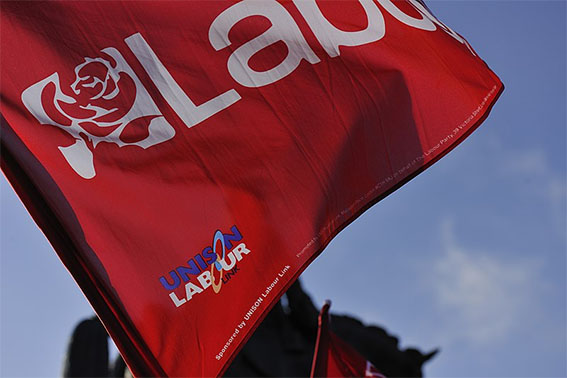Model Motions for Labour Party Conference

Photo: commons.wikimedia.org
We are publishing motions from Labour Green New Deal and one drafted by us that is being circulated by the Campaign for Labour Party Democracy (CLPD). We emailed SERA with a view to publishing any motion they had drafted too, but have not yet heard back. The LGND motion is focussed on the centrality of public ownership to making any green economic recovery viable. The motion we drafted focusses more on the strategic economics of transition and the necessary organisational mechanics for carrying it out as a popular mobilisation.
If you are in the Labour Party, please consider putting one of these forward as your CLP’s motion to national conference. Ed
Green Investment is needed for economic recovery
Conference notes that
- The International Energy Agency stated in 2021 that new oil and gas exploration is incompatible with the Paris Agreement 1.5C limit, making new North Sea investment a stranded asset,
- workers currently employed in oil and gas, and their unions, have called for a just transition pathway to working in the renewable energy sector,
- the cost of living crisis, exacerbated by the Truss government, coincides with excess profits for fossil fuel companies and banks, and wealth gains for the top 10%; which could pay for green investment if taxed.
- Borrowing for investment is the opposite of Trussonomics, because it brings a return and pays for itself
- without investment levels comparable to the US, EU and China, UK manufacturing will decline significantly.
Calls on the Party to
- Actively oppose new fossil fuel exploration
- Develop a plan in the next 6 months, with the involvement of the relevant unions and TUC, for the most rapid possible transition from oil and gas to renewable energy in the North Sea; ready to start from day 1 of the next Labour government.
- Develop Just Transition plans with the relevant unions in every sector, and local authorities in every area, to cut our energy bills, create jobs in insulation, public transport and renewable energy, transform the education system and develop the necessary skills
- Set out a concrete electoral offer for green jobs and insulation in every constituency.
LGND:
Public Power Now
Notes:
- Labour’s plan for Great British Energy (GBE): a public company investing in clean energy generation to de-risk and crowd-in private finance
- The rate of return on oil and gas (10-15%) exceeds renewables (4-8%)
- In 2022, only 5% of oil and gas company capital expenditure went to renewables
- Fossil fuel companies make record profits while they exacerbate the climate crisis
- The public strongly back public ownership of energy (66%)
Believes:
- Privatisation is a massive barrier to a rapid energy transition and decarbonisation, with investment directed towards highly profitable fossil fuels
- Public ownership of the whole energy system would maximise energy security, eliminate regional inequalities, and reduce energy prices
- Workers and communities must be directly involved in designing and implementing energy transition plans to avoid mass layoffs and regional economic decline
- A participatory approach to public ownership would maximise worker and citizen control throughout the system
Resolves to support:
- Democratic public ownership of the whole energy system, including:
- Nationalisation of energy transmission and distribution; energy supply; the UK operations and infrastructure of fossil fuel companies
- Creating a National Energy Agency to set standards and targets; own industries of national importance (e.g., oil and gas, offshore wind, nuclear); coordinate energy transition, including workforce planning
- Creating public Regional and Municipal Energy Agencies to own, invest in, and operate distribution networks; decarbonise heat and electricity; supply energy to households
- Capitalising GBE to completely supplant the private energy sector
- Decommodification of energy, facilitating a right to energy
LGND:
Public Power Now
Notes:
- Labour’s plan for Great British Energy (GBE): a public company investing in clean energy generation to de-risk and crowd-in private finance
- The rate of return on oil and gas (10-15%) exceeds renewables (4-8%)
- In 2022, only 5% of oil and gas company capital expenditure went to renewables
- Fossil fuel companies make record profits while they exacerbate the climate crisis
- The public strongly back public ownership of energy (66%)
Believes:
- Privatisation is a massive barrier to a rapid energy transition and decarbonisation, with investment directed towards highly profitable fossil fuels
- Public ownership of the whole energy system would maximise energy security, eliminate regional inequalities, and reduce energy prices
- Workers and communities must be directly involved in designing and implementing energy transition plans to avoid mass layoffs and regional economic decline
- A participatory approach to public ownership would maximise worker and citizen control throughout the system
Resolves to support:
- Democratic public ownership of the whole energy system, including:
- Nationalisation of energy transmission and distribution; energy supply; the UK operations and infrastructure of fossil fuel companies
- Creating a National Energy Agency to set standards and targets; own industries of national importance (e.g., oil and gas, offshore wind, nuclear); coordinate energy transition, including workforce planning
- Creating public Regional and Municipal Energy Agencies to own, invest in, and operate distribution networks; decarbonise heat and electricity; supply energy to households
- Capitalising GBE to completely supplant the private energy sector
- Decommodification of energy, facilitating a right to energy
